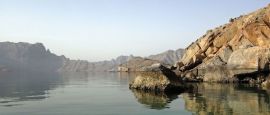Oman History, Language and Culture
History of Oman
Oman's history stretches back thousands of years, shaped by seafaring, trade and a strong sense of independence. Ancient settlements once thrived along its coasts and wadis, exchanging copper and frankincense with Mesopotamia, India and Africa. By the Middle Ages, Oman had become a maritime power, its sailors navigating far across the Indian Ocean and establishing links as far as Zanzibar and East Africa.
The arrival of the Portuguese in the 16th century marked a turbulent period, but by the mid-1600s, Omani forces had expelled them and established an empire of their own. The Al Bu Said dynasty, which still rules today, came to power in the 18th century and helped stabilise the country's trade networks and political influence.
In the 20th century, Oman remained largely isolated until the accession of Sultan Qaboos bin Said in 1970, whose modernisation programme transformed the country with new roads, schools and hospitals while maintaining its cultural traditions. Since then, Oman has been known for its diplomacy, stability and steady development within the Gulf region.
Did you know?
• Oman was once a vast maritime empire, with its influence extending along the East African coast, including Zanzibar, which served as the sultan's second capital in the 19th century.
• The frankincense trade made Oman one of the most important trading hubs of the ancient world. The Boswellia trees of Dhofar still produce some of the finest frankincense on earth.
• The country's forts — more than 500 of them — are among its most distinctive features, reflecting centuries of strategic defence and local craftsmanship. Many, like Nizwa and Bahla, are beautifully restored and open to visitors.
Oman Culture
Oman is an Islamic country, and the majority of the population follows the Ibadi branch of Islam, a sect unique to the country. Sunni and Shia Muslims also form part of the population, and Islam shapes much of Omani culture, daily life and public observance. There are also small communities of Christians, Hindus and other faiths, primarily among expatriates.
Oman is known for its religious tolerance, and non-Muslims are free to practise their faith privately. Churches and temples exist in major cities such as Muscat. Visitors are welcome to visit mosques open to the public, such as the Sultan Qaboos Grand Mosque, provided they dress modestly and follow local customs.
Language in Oman
The official language of Oman is Arabic. It is used in government, education and daily life throughout the country. English is widely spoken in cities, hotels and tourist areas, particularly in Muscat, Salalah and other major towns, and it serves as the main language of business and tourism. In smaller towns and rural areas, however, English proficiency may be limited.
Oman's multicultural population means that other languages are also heard, including Swahili, Hindi, Balochi and Urdu, reflecting the country's long-standing trade and cultural ties with East Africa and South Asia. Learning a few basic Arabic greetings, such as "As-salamu alaykum" (peace be upon you) and "Shukran" (thank you), is greatly appreciated and goes a long way in friendly interactions.




 You know where
You know where